定语从句及被动语态(英语必修1-2语法)
- 格式:doc
- 大小:72.50 KB
- 文档页数:8
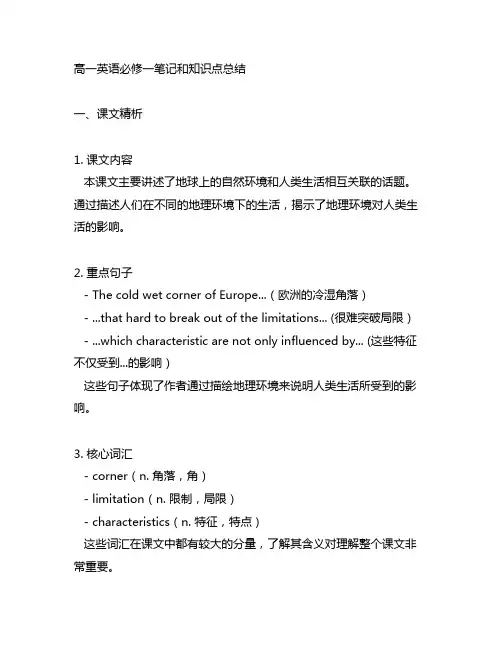
高一英语必修一笔记和知识点总结一、课文精析1. 课文内容本课文主要讲述了地球上的自然环境和人类生活相互关联的话题。
通过描述人们在不同的地理环境下的生活,揭示了地理环境对人类生活的影响。
2. 重点句子- The cold wet corner of Europe...(欧洲的冷湿角落)- ...that hard to break out of the limitations... (很难突破局限) - ...which characteristic are not only influenced by... (这些特征不仅受到...的影响)这些句子体现了作者通过描绘地理环境来说明人类生活所受到的影响。
3. 核心词汇- corner(n. 角落,角)- limitation(n. 限制,局限)- characteristics(n. 特征,特点)这些词汇在课文中都有较大的分量,了解其含义对理解整个课文非常重要。
二、语法重点1. 定语从句本单元的课文中有多处涉及定语从句的使用,如“that hard to break out of the limitations”,“which characteristic are not only influenced by”。
定语从句在句子中修饰名词,起到限定或说明的作用。
2. 被动语态课文中也有多处被动语态的使用,如“The cold wet corner of Europe is inhabited by...”。
被动语态常用于当主语是动作的接受者而不是执行者时。
3. 形容词比较级课文中出现了多处形容词比较级的用法,如“cold wet”,“hard to break out of”。
比较级用于对两者或多者做比较,表示较高、较大或较多。
三、词汇总结1. 当前流行学习法本单元学习了如何通过后缀构词,如“-ful(充满...的)”、“-less(无...的)”,提高对词汇的理解和记忆。
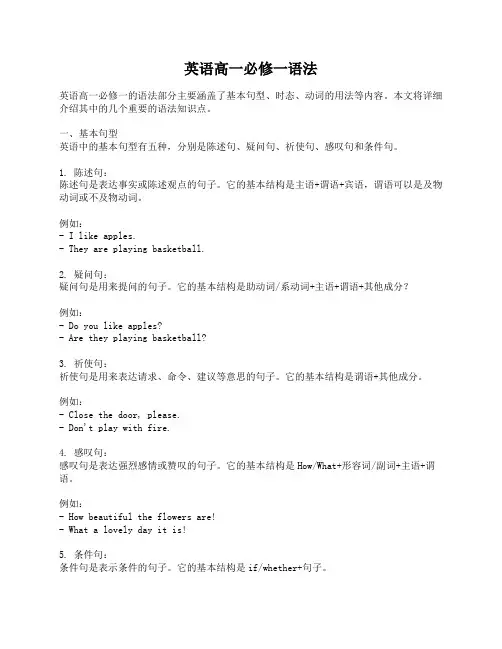
英语高一必修一语法英语高一必修一的语法部分主要涵盖了基本句型、时态、动词的用法等内容。
本文将详细介绍其中的几个重要的语法知识点。
一、基本句型英语中的基本句型有五种,分别是陈述句、疑问句、祈使句、感叹句和条件句。
1. 陈述句:陈述句是表达事实或陈述观点的句子。
它的基本结构是主语+谓语+宾语,谓语可以是及物动词或不及物动词。
例如:- I like apples.- They are playing basketball.2. 疑问句:疑问句是用来提问的句子。
它的基本结构是助动词/系动词+主语+谓语+其他成分?例如:- Do you like apples?- Are they playing basketball?3. 祈使句:祈使句是用来表达请求、命令、建议等意思的句子。
它的基本结构是谓语+其他成分。
例如:- Close the door, please.- Don't play with fire.4. 感叹句:感叹句是表达强烈感情或赞叹的句子。
它的基本结构是How/What+形容词/副词+主语+谓语。
例如:- How beautiful the flowers are!- What a lovely day it is!5. 条件句:条件句是表示条件的句子。
它的基本结构是if/whether+句子。
例如:- If it rains tomorrow, we will stay at home.- Whether she comes or not, I will go to the party.二、时态在英语中,时态用于表示动作发生的时间。
高一必修一中涵盖了一般现在时、一般过去时、一般将来时等几个基本时态。
1. 一般现在时:一般现在时用于表示经常性的动作、习惯、真理、科学事实等。
它的基本结构是主语+谓语。
例如:- She goes to school every day.- Water boils at 100 degrees Celsius.2. 一般过去时:一般过去时用于表示过去发生的动作或状态。
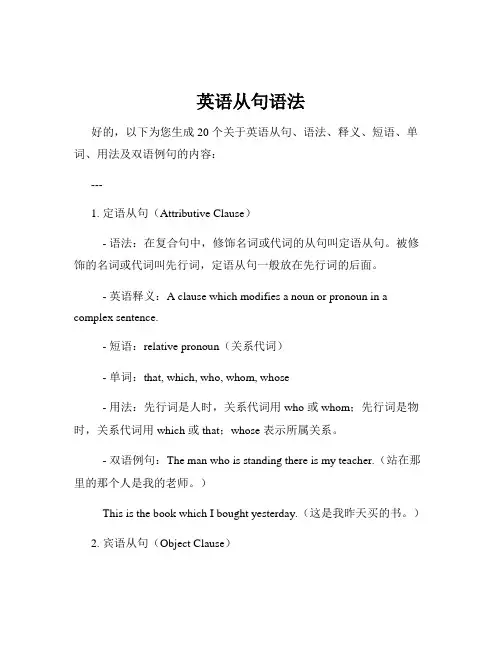
英语从句语法好的,以下为您生成 20 个关于英语从句、语法、释义、短语、单词、用法及双语例句的内容:---1. 定语从句(Attributive Clause)- 语法:在复合句中,修饰名词或代词的从句叫定语从句。
被修饰的名词或代词叫先行词,定语从句一般放在先行词的后面。
- 英语释义:A clause which modifies a noun or pronoun in a complex sentence.- 短语:relative pronoun(关系代词)- 单词:that, which, who, whom, whose- 用法:先行词是人时,关系代词用 who 或 whom;先行词是物时,关系代词用 which 或 that;whose 表示所属关系。
- 双语例句:The man who is standing there is my teacher.(站在那里的那个人是我的老师。
)This is the book which I bought yesterday.(这是我昨天买的书。
)2. 宾语从句(Object Clause)- 语法:在句子中起宾语作用的从句叫做宾语从句。
宾语从句分为三类:动词的宾语从句,介词的宾语从句和形容词的宾语从句。
- 英语释义:A clause that functions as the object of a verb, a preposition or an adjective in a sentence.- 短语:object complement(宾语补足语)- 单词:if, whether, that- 用法:宾语从句要用陈述句语序;一般情况下,if 和 whether 可以互换,但在whether...or not 结构中,以及在介词后,只能用whether。
- 双语例句:I don't know if/whether he will come.(我不知道他是否会来。

高中必修一到必修五主要语法点必修一:直接引语和间接引语(宾语从句);现在进行时表将来;定语从句必修二:定语从句(非限定定从、定从中的介词前提);被动语态(一般将来时、现在完成时及现在进行时的被动语态) 必修三:情态动词;名词性从句(主语从句、宾语从句、表语从句及同位语从句)必修四:主谓一致;非谓语动词(V-ing) ;构词法必修2 第一单元,非限制性定语从句的第二单元一般将来时的主被动第三单元现在完成时的主被动第四单元现在进行时的主被动第五单元介词+which/whom的用法必修3 一二单元情态动词的用法三单元宾语从句和表语从句四单元主语从句五单元同位语从句必修4 第一单元主谓一致第二单v-ing作主语和宾语的用法第三单元v-ing作表语,定语和宾语补足语第四单元v-ing作状语第五单元构词法必修5 第一单元过去分词作定语和表语第二单元过去分词作宾语补足语第三单元过去分词作状语第四单元倒装句第五单元省略句必修一各单元知识点总结Unit One Friendship一、重点短语1.go through 经历,经受get through 通过;完成;接通电话2. set down 记下,放下3. a series of 一系列4 on purpose 有目的的5. in order to 为了6. at dusk 傍晚,黄昏时刻7. face to face 面对面8. fall in love 爱上9. join in 参加(某个活动);take part in 参加(活动)join 加入(组织,团队,并成为其中一员)10. calm down 冷静下来11. suffer from 遭受12. be/get tired of…对…感到厌倦13. be concerned about 关心14. get on/along well with 与…相处融洽15. be good at/do well in 擅长于…16. find it + adj. to do sth. 发现做某事是…17. no longer / not …any longer 不再…18. too much 太多(后接不可数n.)much too 太…(后接adj.)19. not…until 直到…才20. it’s no pleasure doing sth 做…并不开心21. make sb. sth. 使某人成为…make sb. do sth. 使某人做某事二、语法----直接引语和间接引语概念:直接引语:直接引述别人的原话。
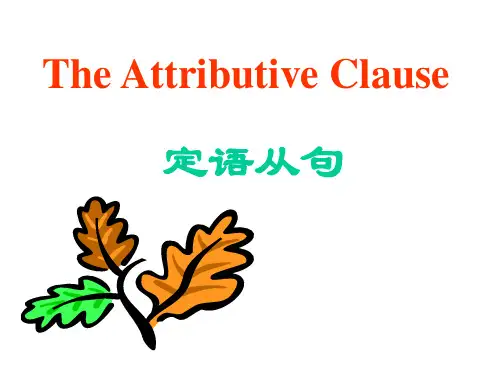
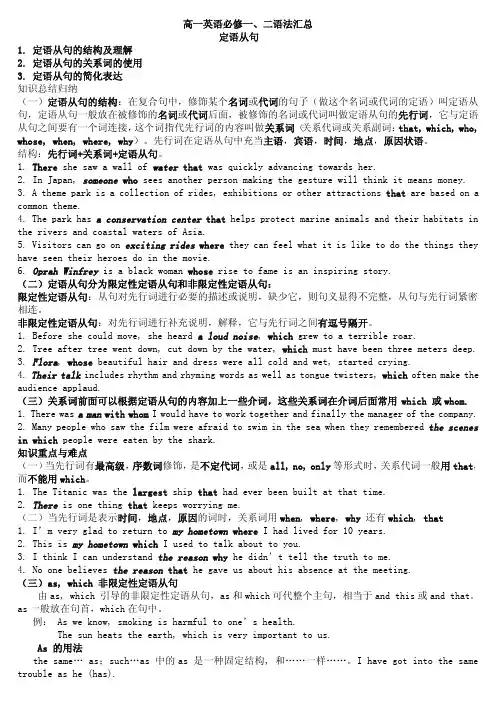
高一英语必修一、二语法汇总定语从句1.定语从句的结构及理解2.定语从句的关系词的使用3.定语从句的简化表达知识总结归纳(一)定语从句的结构:在复合句中,修饰某个名词或代词的句子(做这个名词或代词的定语)叫定语从句,定语从句一般放在被修饰的名词或代词后面,被修饰的名词或代词叫做定语从句的先行词,它与定语从句之间要有一个词连接,这个词指代先行词的内容叫做关系词(关系代词或关系副词:that,which,who, whose,when,where,why)。
先行词在定语从句中充当主语,宾语,时间,地点,原因状语。
结构:先行词+关系词+定语从句。
1.There she saw a wall of water that was quickly advancing towards her.2.In Japan,someone who sees another person making the gesture will think it means money.3.A theme park is a collection of rides,exhibitions or other attractions that are based on a common theme.4.The park has a conservation center that helps protect marine animals and their habitats in the rivers and coastal waters of Asia.5.Visitors can go on exciting rides where they can feel what it is like to do the things they have seen their heroes do in the movie.6.Oprah Winfrey is a black woman whose rise to fame is an inspiring story.(二)定语从句分为限定性定语从句和非限定性定语从句:限定性定语从句:从句对先行词进行必要的描述或说明,缺少它,则句义显得不完整,从句与先行词紧密相连。

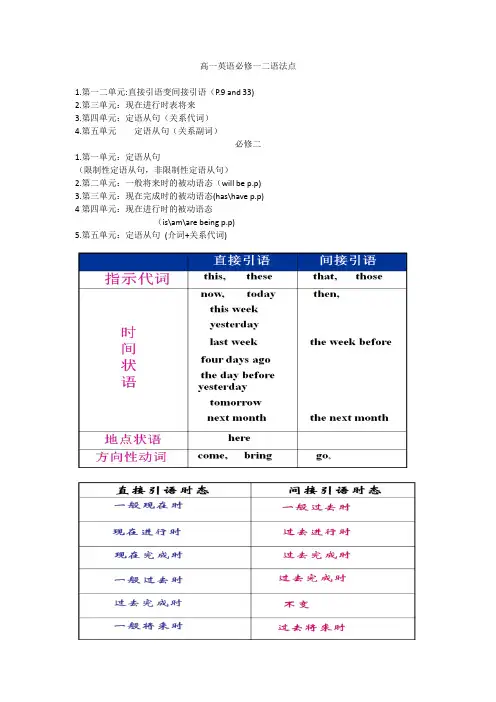
高一英语必修一二语法点1.第一二单元:直接引语变间接引语(P.9 and 33)2.第三单元:现在进行时表将来3.第四单元:定语从句(关系代词)4.第五单元定语从句(关系副词)必修二1.第一单元:定语从句(限制性定语从句,非限制性定语从句)2.第二单元:一般将来时的被动语态(will be p.p)3.第三单元:现在完成时的被动语态(has\have p.p)4第四单元:现在进行时的被动语态(is\am\are being p.p)5.第五单元:定语从句(介词+关系代词)定语从句结构:先行词+关系词(连接词)+从句① 行词是人② 先行词是物③ 一般情况下考的简易的类型:④ 物用which人用who⑤ 所属关系用whose⑥ 逗号之后不可that⑦ 特殊that要牢记特殊that 考点1. all,some,any,no,little,much,few,thing系列,body系列,none, the one.2.the+ 序数词(first,second,last,next)the very, the only3.人+物4.开头已经有who,为避免重复,改用that.定语从句分类:2种1.限制性定语从句2.非限制性定语从句(标志是,)意义上基本上没有区别只通过形式判断就行例句:Yesterday I sold a bike, which I bought a month ago.非限需要注意的问题:千万不可用that, 除此之外连词都可以选择比如常用到的which,who, where, whom….强调句强调句构成:It is\was 被强调部分that +从句例子:I like winter.It is I that like winter.(强调主语)It is winter that I like.(强调宾语)现在进行时表将来结构:am\is\are + doing现在进行时表将来常用词:come go start arrive leave stay初高中误区:am\is\are + doing 不仅仅是现在进行时的标志在高中新的语法知识中:它还能表示将来= will被动语态列举子:I study English.(一般现在时)English is studied by me.I studied English last year. (一般过去时)English was studied by me last year.I am studying English now.(现在进行时)English is being studied by me now.I have studied English for one year.(现在完成时)English has been studied by me for one year.I will study English next week.(一般将来时)第二步:找出时间状语的词现在进行:now, look…现在完成:since, yet, by now,by the end ofever sincefor +一段时间一般将来时:next +时间状语tomorrowin the future……第三步:选择被动语态形式。
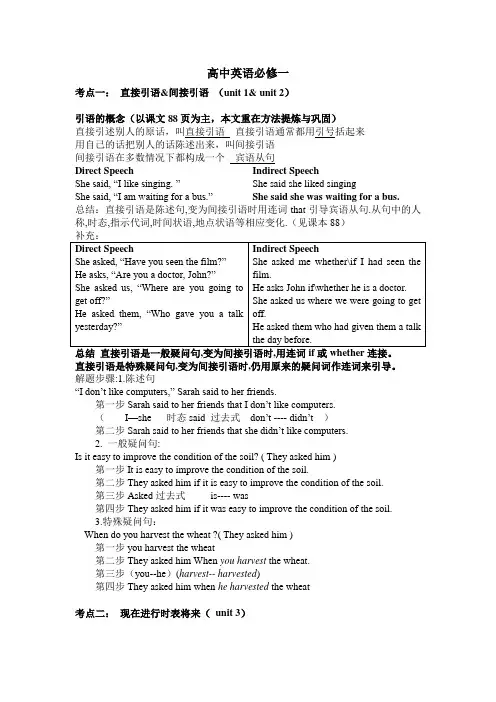
高中英语必修一考点一:直接引语&间接引语(unit 1& unit 2)引语的概念(以课文88页为主,本文重在方法提炼与巩固)直接引述别人的原话,叫直接引语直接引语通常都用引号括起来用自己的话把别人的话陈述出来,叫间接引语间接引语在多数情况下都构成一个_宾语从句Direct SpeechShe said, “I like singing. ”She said, “I am waiting for a bus.”Indirect SpeechShe said she liked singingShe said she was waiting for a bus.总结:直接引语是陈述句,变为间接引语时用连词that引导宾语从句.从句中的人称,时态,指示代词,时间状语,地点状语等相应变化.(见课本88)直接引语是特殊疑问句,变为间接引语时,仍用原来的疑问词作连词来引导。
解题步骤:1.陈述句“I don’t like computers,” Sarah said to her friends.第一步Sarah said to her friends that I don’t like computers.(I—she 时态said 过去式don’t ---- didn’t )第二步Sarah said to her friends that she didn’t like computers.2.一般疑问句:Is it easy to improve the condition of the soil? ( They asked him )第一步It is easy to improve the condition of the soil.第二步They asked him if it is easy to improve the condition of the soil.第三步Asked过去式is----was第四步They asked him if it was easy to improve the condition of the soil.3.特殊疑问句:When do you harvest the wheat ?( They asked him )第一步you harvest the wheat第二步They asked him When you harvest the wheat.第三步(you--he)(harvest--harvested)第四步They asked him when he harvested the wheat考点二:现在进行时表将来(unit 3)用现在进行时表示将来1. 指的是近期的,按计划或安排要发生的动作;谓语通常为瞬间性的动词如:come, go, arrive, leave, start, begin, return, meet, get 等。
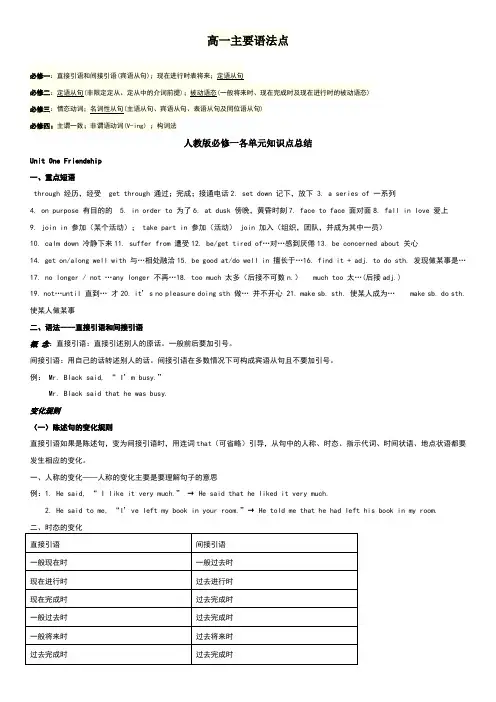
高一主要语法点人教版必修一各单元知识点总结Unit One Friendship一、重点短语through 经历,经受 get through 通过;完成;接通电话2. set down 记下,放下 3. a series of 一系列4. on purpose 有目的的5. in order to 为了6. at dusk 傍晚,黄昏时刻7. face to face 面对面8. fall in love 爱上9. join in 参加(某个活动); take part in 参加(活动) join 加入(组织,团队,并成为其中一员)10. calm down 冷静下来11. suffer from 遭受12. be/get tired of…对…感到厌倦13. be concerned about 关心14. get on/along well with 与…相处融洽15. be good at/do well in 擅长于…16. find it + adj. to do sth. 发现做某事是…17. no longer / not …any longer 不再…18. too much 太多(后接不可数n.) much too 太…(后接adj.)19. not…until 直到… 才20. it’s no pleasure doing sth 做… 并不开心 21. make sb. sth. 使某人成为… make sb. do sth. 使某人做某事二、语法----直接引语和间接引语概念:直接引语:直接引述别人的原话。
一般前后要加引号。
间接引语:用自己的话转述别人的话。
间接引语在多数情况下可构成宾语从句且不要加引号。
例:Mr. Black said, “ I’m busy.”Mr. Black said that he was busy.变化规则(一)陈述句的变化规则直接引语如果是陈述句,变为间接引语时,用连词that(可省略)引导,从句中的人称、时态、指示代词、时间状语、地点状语都要发生相应的变化。
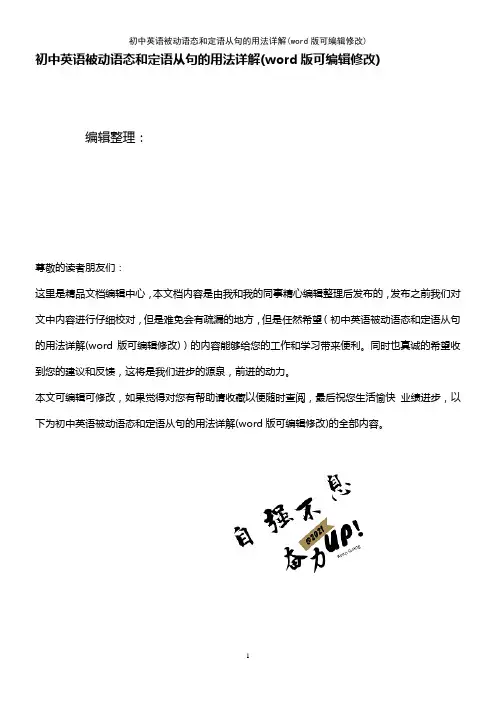
初中英语被动语态和定语从句的用法详解(word版可编辑修改)编辑整理:尊敬的读者朋友们:这里是精品文档编辑中心,本文档内容是由我和我的同事精心编辑整理后发布的,发布之前我们对文中内容进行仔细校对,但是难免会有疏漏的地方,但是任然希望(初中英语被动语态和定语从句的用法详解(word版可编辑修改))的内容能够给您的工作和学习带来便利。
同时也真诚的希望收到您的建议和反馈,这将是我们进步的源泉,前进的动力。
本文可编辑可修改,如果觉得对您有帮助请收藏以便随时查阅,最后祝您生活愉快业绩进步,以下为初中英语被动语态和定语从句的用法详解(word版可编辑修改)的全部内容。
初中英语被动语态的用法详解一、被动语态的结构主动语态(The Active Voice)表示主语是动作的执行者. 被动语态(The Passive Voice)表示主语是动作的承受者。
构成:承受者+助动词be+及物动词的过去分词+by+执行者一般现在时:am/is/are+过去分词。
一般过去时:was/were+过去分词一般将来时:shall /will be +过去分词现在完成时:have /has been +过去分词现在进行时:am/is/are+being+过去分词.过去将来时:should /would be +过去分词。
含情态动词的被动结构:情态动词+be+过去分词。
二、被动语态的用法1)当我们不知道动作的执行者是谁,或者没有必要指出动作的执行者时,需用被动语态。
2)当我们需要强调动作的承受者时,常用被动语态。
3)如果需要说出动作的执行者, 用by引导出动作的执行者.主动语态变为被动语态时,其谓语动词的时态要与原句时态保持一致,其谓语动词的数要与新主语保持一致.三、主动语态变为被动语态的情况1)主语+谓语动词+宾语将主动语态的宾语变为被动语态的主语。
(主动)We bought a book yesterday。
(被动)The book was bought yesterday。
Unit 11.get(have) sb. done 让某人做某事When he/she borrowed it last time, he/she broke it and you had to pay to get it repaired.2.look through 仔细查看;浏览It’s no pleasure looking through these any longer because nature is one thing that really must be experienced.3.upset vt.使心烦意乱;使苦恼;使伤心①upset oneself about sth. 为某事而烦恼②be/get upset about sth.为某事而烦恼或难过4.dislike vt.不喜欢;讨厌①dislike doing sth.不喜欢做某事;讨厌做某事②dislike one’s doing sth.不喜欢某人做某事;讨厌某人做某事③dislike it when… 讨厌5.concern vt.使担忧;使烦恼;对……负责,与……有牵连n.关系;担心;忧虑;关心的事①concern oneself about/be concerned about 为……担忧②concern oneself with/be concern with 关注;涉及;关于③concerning 关于6.go through 通过;穿过;经受;仔细检查;完成7.look through 审核;浏览8.get along with 与……相处;进展9.before引出时间状语从句常可译为汉语“还没……就……”,“还没来得及……就……”,“……以后才……”或“不等……就……”,此时,从句中可用情态动词can 或couldShe and her family hid away for nearly twenty-five months before they were discovered.她和家人躲藏了两年,后来被发现了。
被动语态专讲一、引言汉语中对于被动语态的使用简直是小菜一碟,想必大家初次接触到“把”字句、“被”字句时大都不屑一顾。
很少有人主动把中文主被动的转换当作大碍。
但英文中因为动词时态的复杂,在转换成被动语态时自然容易搅得人头昏脑胀。
事实上我们经常用到的一些口语句型就是被动结构,如“Well done”、“The plane’s been delayed 10 minutes”等等。
如何对付被动语态,本文正是对症下药的良方一剂。
二、语态概述语态是动词的一种形式,表示主语和谓语的关系。
英语中有两种语态:主动语态和被动语态。
主动语态表示主语是动作的执行者,即是主语在做这个动作;而被动语态则表示主语是动作的承受者,即动作的对象,此时,主语是动作的逻辑宾语。
例如:My uncle repaired the TV set yesterday. 昨天我叔叔修理了那台电视机。
The TV set was repaired (by my uncle) yesterday. 那台电视机昨天被(我叔叔)修理了。
三、被动语态的构成被动语态是由“be动词+(及物动词)过去分词”构成。
若要特别强调动作或行为的执行者时,句子后边需接by…,译为“被(由)……”。
不同时态的被动语态主要体现在助动词be的变化上,同时助动词be还要在人称和数上与主语保持一致。
现已及物动词do为例,其各种时态四、被动语态的用法五、两种语态互变☆主动语态变被动语态1.2. 把谓语变成被动结构(be +过去分词),时态要跟原主动语态一致;3. 主动语态的主语变为介词by的宾语,若为代词,要将主格改为宾格。
如果不强调动作的执行者,by短语可省略。
例如:主动句:People play football all over the world.被动句:Football ____________ (by people) all over the world.☆被动语态变主动语态被动句:This song was ________ (写) by Andy Lau.主动句:Andy Lau ________ (写) this song.六、特殊结构的被动语态1. 双宾结构的被动语态主动结构中如果有两个宾语,变成被动结构时,只将其中一个宾语变成主语,另一个宾语保留不变(即:变一留一)。
专题—定语从句(一)定义及相关术语1.定语从句:修饰某一名词或代词的从句叫定语从句。
定语从句一般紧跟在它所修饰的先行词之后。
2.先行词:被定语从句修饰的词叫先行词。
3.关系词:引导定语从句的词叫关系词。
关系词有关系代词和关系副词。
关系代词有that, which, who, whom, whose, as等;关系副词有when, where, why等。
关系词通常有下列三个作用:A、引导定语从句;B、代替先行词;C、在定语从句中担当一个成分。
例如:The man who is shaking hands with my father is a policeman. 该句中,who is shaking hands with my father 是定语从句,修饰先行词the man,“who”是引导定语从句的关系词,代替先行词the man,在定语从句中作主语。
(二)关系代词引导的定语从句1.who 指人,在定语从句中作主语。
The boys who are playing football are from Class One. 正在踢足球的男孩是一班的。
Those who want to go to the museum must be at the school gate at 7 tomorrow morning. 想去博物馆的人必须在明晨7点到大门口集合。
Yesterday I helped an old man who had lost his way. 昨天我帮助了一位迷路的老人。
That is the teacher who teaches us physics. 那就是教我们物理的老师。
2.whom 指人,在定语从句中做宾语,常可省略。
Mr Liu is the person ( whom ) you talked about on the bus. 刘先生就是你们在公共汽车上谈论的那个人。
英语被动语态用法归纳总结一、被动语态定义和用法当我们要突出某个行为的执行者时,应使用主动语态来表达,而要强调动作的承受者时,就要使用被动语态来表达。
主语为动作的执行者时,表示主动语态。
e.g. He told the story. (主动语态)他讲了这个故事。
主语为动作的承受者时,表示被动语态。
e.g.The story was told by him. (被动语态)这个故事被他讲了。
二、一般现在时被动语态的各类句式总结如下:1. 肯定句:主语+am / is / are+动词过去分词(+by+动作执行者)2. 否定句:主语+ am / is / are not+动词过去分词(+by+动作执行者)3. 一般疑问句:Am / Is / Are +主语+动词过去分词(+by+动作执行者)4. 特殊疑问句:特殊疑问词+ am / is / are + 主语+动词过去分词(+by+动作执行者)e.g. This song is still loved by many young people today.这首歌现在仍然受到许多年轻人的喜爱。
(肯定句)This camera is not made in Japan.这部相机不是日本制造的。
(否定句)—Is the film called Snow White?这部电影是叫《白雪公主》吗?(一般疑问句)—Yes, it is. / No, it isn’t. 是的。
/不是。
—How many people were mentioned in the conversation?(特殊疑问句) 对话中提到了几个人?—Two. 两个。
三、一般过去时的被动语态被动语态的动词形式为:be+动词的过去分词,其中be为助动词,根据不同的人称和时态有形式的变化。
因此,一般过去时的被动语态为:1. 肯定句:主语+was/were+动词过去分词(+ by+动作执行者)e.g. The letter was written by Jim.2. 否定句:主语+was/were not+动词过去分词(+ by+动作执行者)e.g. The letter wasn’t written by Jim.3.一般疑问句:Was/Were+主语+动词过去分词+(by+动作执行者)e.g. Was the letter written by Jim?4. 特殊疑问句:特殊疑问词+was/were+主语+动词的过去分词+(by+动作执行者)e.g. When was the letter written by Jim?当动词不定式作宾语补足语时,要把主动语态中表人的直接宾语变为被动语态的主语,宾语补足语的位置不变。
高中必修一到必修五重要语法点a必修一:直接引语和间接引语(宾语从句);现在进行时表将来;定语从句必修二:定语从句(非限定定从、定从中的介词前提);被动语态(一般将来时、现在完毕时及现在进行时的被动语态)必修三厂情态动词;名词性从句(主语从句、宾语从句、表语从句及同位语从句)必修四:主谓一致;非谓语动词(V-ing);构词法必修2第一单元,非限制性定语从句的第二单元一般将来时的主被动第三单元现在完毕时的主被动第四单元现在进行时的主被动第五单元介词+which/whom的用法a必修3 一二单元情态动词的用法三单元宾语从句和表语从句四单元主语从句4五单元同位语从句必修4第一单元主谓一致第二单v-ing作主语和宾语的用法第三单元v-ing作表语,定语和宾语补足语第四单元v-ing作状语第五单元构词法④必修5第一单元过去分词作定语和表语第二单元过去分词作宾语补足语第三单元过去分词作状语第四单元倒装句第五单元省略句必修一各单元知识点总结U n it One Friendship一、重点短语1.go through经历,经受g et thro u gh通过浣毕;接通电话set d o w n 记下,放下2. a ser i e s of 一系列onpurpo s e 有目的的3.i n ord e r to 为了at d u sk傍晚,黄昏时刻4. f ace to fa c e 面对面fa 1 1 i n lo v e 爱上5.j o in in 参与(某个活动);take part in 参与(活动)j oin加入(组织,团队,并成为其中一员)1.0 . ca 1 m down冷静下来suff e r f r o m 遭受11.be/ g et tired of…对…感到厌倦be co n cerned about 关心12.get on/al o n g well with 与..・相处融洽He has written a b o o k whose nam e I've f orgott e n.(指物,作宾语)5.关系副词when的用法关系副词when在定语从句中作时间状语例:1) ril nev e r forget the t i m e whe n (=d u r in g wh i ch) w e w o rke d o n t h e fa r m.2) Do you rem e mb e r the aft e rno o n when (=on wh i ch) we f irst met three years ago?6.关系副词where在定语从句中的用法关系副词w h ere在定语从句中做地点状语例:1) This i s the p la c e where ( =at/ in w h ich) w e first met.2) The hotel wh e re (= in wh i ch ) w e sta y ed w a sn't ve r y cl e a n .7. 关系副词why在定语从句中的用法关系副词why在定语从句中作因素状语例:1). I d i d n 9t get a p a y r i se, but t his was n't the reason why(= f or whic h ) I le f t.2 ). The rea s on w h y (=f o r which) he h as 1 a te was that he misse d the train.Uni t 5 Nelson M a ndel a -a mod e rn he r o一、重点词汇1.se 1 fis h自私的sei f le s s无私的d e v o te on e self to...致力于;献身于2.fi g h t aga i ns t 对抗,反对f i ght for为…而战pri n c i pie 原贝Uprincipal校长;重要的3.. o f f er guidance to…给…提供指导out o f wo r k 失业4.j oin加入(组织,俱乐部,成为其中一员)join i n参与(活动)take pa r t in参与(活动)a s + adj +as one c an 尽也许…=as + adj. + a s p o ss i ble. a s a m a 11 e r of fa c t 事实上(=in fac t )1.0 . blow up爆炸,炸掉set up 建立;set abou t 着手,开始做(set ab o u t do i ng sth.)s e t off 出发,动身;set out 开始,出发(set ou t t o d o s th.)b e s ent e nc e d to 被判・・・11. b e equ a 1 t o与…相等;胜任be p ro u d of 为...感至U 自豪12.g i v e out分发(give off 散发出(气味))die fo r 为…而死die o f死于(自身因素,如疾病)die from死于(外在因素,如车祸)realiz e o n e's dream of ... 实现..的梦想18.on 1 y位于句首时,要主谓倒装例:On 1 y t h en did w e deci d e t o answ e r vi o 1 e nee with vio 1 ence.O n ly i n thi s way, can we prote c 11 h e en v i ronm e nt bet t er.二语法.一・・定语从句详见第四单元15.be good at/do we 1 1 i n 擅长于…16.f i n d i t + ad j . t o do sth.发现做某事是…17.no 1 o n g er / not ...any longe r 不再…1 8. too muc h太多(后接不可数n.) much t oo太…(后接adj.)19.not…unt i 1直到…才20.i t ' s n o plea s ure do i ng s t h 做… 并不开心21.make s b . s th.使某人成为…make s b. do s t h.使某人做某事二、语法-・一-直接引语和间接引语勰念直接引语:直接引述别人的原话。
定语从句及专项练习定语从句——修饰名词或代词的从句。
换句话说,名词、代词后的从句叫定语从句。
先行词——被定语从句修饰的名词、代词、甚至词组或句子叫先行词。
关系词——引导定语从句的词叫关系词。
关系词分两种:一是关系代词(在定语从句中担任主、宾、表、定语成分)二是关系副词(在定语从句中担任状语成分)关系词的三个功能:1. 连接功能(连接先行词与定语从句);2. 担任功能(在定语从句中担任主、宾、表、定、状语);3. 替代功能(在定语从句中代替先行词)。
A plane is a machine. The machine can fly. ——A plane is a machine, and the machine can fly. ——A plane is a machine that can fly.关系代词有:who, whom, whose, that, which, as在定语从句中可担任主语的是:who, that, which, as在定语从句中可担任宾语的是:who, whom, that, which, as在定语从句中可担任定语的是:whose, which当先行词是人时,可用的关系词是:who, whom, that, as当先行词是物时,可用的关系词是:which, that, whose, as关系副词有:when (先行词为时间), where (先行词为地点), why (先行词为原因)关系副词= 介词+ which / whom定语从句分为两种:限制性与非限制性。
先行词与关系词之间无逗号隔开为限制性;有逗号隔开则为非限制性。
非限制性定语从句一般不可用关系代词that引导。
唯一可以置于先行词之前的定语从句由关系代词as 引导。
以下练习详细介绍了定语从句使用的具体语法规则。
一.单选:1. A football fan is _____ has a strong interest in football.A. thatB. whoC. a person whoD. what2. The house, _____ was destroyed in the terrible fire, has been repaired.A. whose roofB. which roofC. its roofD. the roof3. Can you lend me the novel _____ the other day?A. that you talkedB. you talked about itC. which you talkedD. you talked about4. The matter _____ you were arguing about last night has been settled.A. thatB. whatC. whyD. for which5. They talked for about an hour of things and persons _____ they remembered in the school.A. whichB. thatC. whoD. whom6. Who _____ has common sense(常识)will do such a thing?A. whichB. whoC. whomD. that7. All the apples _____ fell down were eaten by the pigs.A. thatB. thoseC. whichD. what8. They asked him to tell them everything _____ he saw at the front.A. whatB. thatC. whichD. where9. I’ll tell you _____ he told me last night.A. all whichB. all whatC. that allD. all10. A child _____ parents have died is called an orphan.A. whoB. who’sC. whoseD. which11. I s this the museum _____ you visited the other day?A. thatB. whereC. in whichD. the one12. Is this museum _____ some German friends visited last Wednesday?A. thatB. whereC. in whichD. the one13. —How do you like the book? —It’s quite different from _____ I read last month.A. thatB. whichC. the oneD. the one what14. Is that the reason _____ you are in favor of the proposal?A. whichB. whatC. whyD. for that15. The train _____ she was traveling was late.A. whichB. whereC. on whichD. in that16. He has lost the key to the drawer _____ the papers are kept.A. whereB. on whichC. under whichD. which17. Antarctic _____ we know very little is covered with thick ice all the year round.A. whichB. whereC. thatD. about which18. He arrived at a time, ______, in his opinion, was rather inappropriate for them.A. thatB. /C. whichD. when19. He often helps the students _____ he thinks are not quick at their studies.A. whomB. whoC. whenD. because20. The Second World War _____ millions of people were killed ended in 1945.A. whenB. during thatC. in whichD. which21. He was born in the year _____ the Anti-Japanese War broke out.A. whichB. whenC. on whichD. during which22. Mr. Crossett will never forget the day _____ he spent with his various students.A. whenB. whichC. on whichD. in which23. This is just the place _____ I am looking forward to visiting these years.A. thatB. whereC. in whichD. to where24. We are going to spend the Spring Festival in Guangzhou, _____ live my grandparents.A. whichB. thatC. whoD. where25. The hotel _____ during our holidays stands by the seaside.A. in which we stayedB. where we stayed atC. we stayedD. in that we stayed26. I have bought the same dress _____ she is wearing.A. asB. thatC. whichD. than27. He is not _____ a fool _____.A. such/as he is lookedB. such/as he looksC. as/as he is lookedD. so/as he looks28. The time ______ was given to us was too limited. We must hurry up.A. whenB. during whichC. thatD. for which29. Some of the roads were flooded, _____ made our journey more difficult.A. whichB. itC. whatD. that30. He must be from Africa, _____ can be seen from his skin.A. thatB. asC. whoD. what31. He has two sons, _____ work as chemists.A. two of whomB. both of whomC. both of whichD. all of whom32. The buses, _____ were already full, were surrounded by an angry crowd.A. most of thatB. which mostC. most of whichD. that most33. My glasses, _____ I was like a blind man, fell to the ground and broke.A. whichB. with whichC. without whichD. that34. Mr. Wu, _____ everybody likes, is going to give us a talk on chemistry.A. whomB. thatC. whichD. /35. This is Mr. Smith, _____ I think has something interesting to tell us.A. whoB. whomC. thatD. /36. _____, the compass was first made in China.A. It is known to allB. It is known thatC. We all knowD. As is known to all37. I, _____ your good friend, will try my best to help you out.A. who isB. who amC. that isD. what is38. He is a man of great experience, _____ much can be learned.A. whoB. thatC. from whichD. from whom39. It was such a serious mistake, _____ caused by carelessness.A. which I think wasB. which I think it wasC. I think which wasD. I think which it was40. He lived in London for 3 months, during _____ he picked up some English.A. thisB. whichC. thatD. when41. The general at last got a chance to visit the village _____ he used to fight, _____ hehad been dreaming of for years.A. that/whichB. where/thatC. in which/whatD.where/which42. I will hire the man _____ they say is a good English speaker.A. whoB. thatC. whichD. whom43. He has to work on Sundays, _____ he does not like.A. and whichB. whichC. and whenD. when44. I gave him a warning, _____ he turned a deaf ear.A. of whichB. for whichC. to thatD. to which45. My father has made me _____ I am.A. whoB. whichC. whatD. that46. She is one of the few girls who _____ passed the examination.A. wasB. wereC. hasD. have47. He is my son, _____ a better son does not exist.A. butB. than whoC. against whomD. than whom48. As many members _____ were present agreed to the plan.A. whoB. thatC. whichD. as49. You may call on me from one to five o’clock, during _____ I am always at home.A. the timeB. what timeC. that timeD. which time50. China is the birthplace of kites, _____ kiteflying (放风筝) spread to Japan, Korea, andIndia.A. from thereB. whereC. from whereD. there二. 用定语从句完成下列句子:1. I’ve grown so crazy about everything ________________________________________________(与大自然有关的).2. I am only able to look at nature through dirty curtains ____________________________ (挂在满是灰尘的窗前的).3. Later in the next century, people ___________________________ (来自英格兰的) made voyageto conquer other parts of the world.4. At first the English ________________________________________________________________(在公元450至1150年间所说的) was very different from the English which/that is spoken today.5. When I told her that our journey would begin at an altitude ________________________________(有五千多米高的), she seemed to be excited about it.6. The book ______________________________________________ (老师刚刚提到的) will be veryhelpful with our English learning.7. Mr. Smith is very wealthy, but he is always driving an old car ____________________________(门都已经破了的).8. Scientists are trying to explain the reasons _____________________________________________(为什么地球正在变暖).9. Li Hua has two cousins ___________________________________ (在北京工作的), and anotherone _______________________________ (在家乡务农的).10. There are three books on the desk, all of _______________________________________________(都是有关南非黑人的平等权利的).Answers to the practice:一.1 – 5 CADAB 6 – 10 DABDC11 – 15 ADCCC 16 – 20 ADCBC21 – 25 BBADA 26 – 30 ABCAB31 – 35 BCCAA 36 – 40 DBDAB41– 45 D ABDC 46 – 50 DCDDC二.1.that has something to do with nature2.that/which were hanging before very dusty windows3.who came from England4.which/that was spoken in England between about AD 450 and 11505.which/that was of more than 5,000 meters6.which/that the teacher mentioned just now7.whose door is broken8.why the earth is becoming warmer9.who are working in Beijing; who is farming in the hometown10.which are about the equal rights for black people in South Africa被动语态基础练习选择题1.Our house_____,A . is getting paintB . is getting paintedC . is got paintedD . has got to paint2.He arrived in Beijing,where he_____his friend .A . was met byB . was metC . was meetingD . met by3.The war_____in 1937A . was broken outB . had been broken outC . has broken outD . broke out4.The mistakes in the exercises will_____the teacher.A . crossB . be crossingC . be crossed byD . cross by5.My brother and I have __________her birthday party.A . been invitedB . been invited forC . invited toD . been invited to6.It_______this wayA . is had to doB . is had to be doneC . had to be doneD . has to do7.It__this way.A used to doB . used to be doneC . is used to doD . is used to doing8._____Chaplin.A . The child's name was calledB . The child's name callsC . The child callsD . The child is named9.The sports meeting____ .A . is put offB . is to put offC . is to be put offD . puts off10.Mary realized she_________A . was making fun ofB . was made funC . was being made fun ofD . was being made fun11.______to say a thing in that wayA . It is considers wrongB . It is considered wrongC . It is considered it's wrongD . It is consiedring wrong12.He ordered that the books_______at once.A . would be printedB . would printC . be printedD . print13.The story______in ChinA .A . was taken placeB . was happenedC . took placeD . has been taken place14.The house_____my parentsA . is belong toB . belong toC . belongs toD . is belonged to15.He_______by his teacher.A . happened to seeB . was happened to seeC . happened to be seenD . was happened to be seen16.Great changes_____in our province.Many tall buildings.A . have been taken place, have been set upB . have taken place, have been set upC . have been taken place, have been set upD . were taken place, were set up17.The hall's____but it's not yet____with lamps.A . furnished, finishedB . been finished, been furnishedC . being finished, being furnishedD . set up, full18.The new hall is the tallest building in this town._____from here?A . Can it seeB . Can it be seenC . Can it seenD . Can see19.As soon as we got to the airport,we found that the plane_____.A . had already taken offB . already took offC . was already taking offD . was already taken off20. Some of the hotels in my hometown_________.A . have now been rebuildingB . are now rebuildingC . are now being rebuiltD . are rebuilt now21. If city noises ____ from increasing,people ____ shout to be heard even at dinner.A . are not kept;will have toB . are not kept;haveC . do not keep;will have toD . do not keep;have to22. The fifth generation computers, with artificial intelligence, are ____and perfected now.A . developedB . have developedC . are being developedD . will have been developed23. --- ____ the sports meet might be put off.--- Yes,it all depends on the weather.A . I've been toldB . I've toldC . I'm toldD . I told24. I need one more stamp before my collection ___.A . has completedB . completesC . has been completedD . is completed25. Rainforests ___ and burned at such a speed that they will disappear fromthe earth in the near future.A . cutB . are cutC . are being cutD . had been cut26. The new suspension bridge ___ by the end of last month.A . has been designedB . had been designedC . was designedD . would be designed27.When a pencil is partly in a glass of water, it looks as if it ____.A . breaksB . has brokenC . was brokenD . had been broken28. Great changes ___ in the city, and a lot of factories ___.A . have been taken place; have been set upB . have taken place; have been set upC . have taken place; have set upD . were taken place; were set up29. That suit __ over 60 dollars.A . had costedB . costedC . is costedD . cost30. --- Look! Everything here is under construction. --- What's the pretty small house that __ for?A . is being builtB . has been builtC . is builtD . is building31.--- Do you like the material? --- Yes, it ___ very soft.A . is feelingB . feltC . feelsD . is felt32. It is difficult for a foreigner ____ Chinese.A . writeB . to writeC . to be writtenD . written33. I have no more letters ____ ,thank you.A . to typeB . typingC . to be typedD . typed34. Take care! Don't drop the ink on your shirt, for it __ easily.A . won't wash outB . won't be washed outC . isn't washed outD . isn't washing out35. Nobody noticed the thief slip into the house because the lights happened to ___.A . be put upB . give inC . be turned onD . go out36. The computers on the table ___ Professor Smith.A . belongsB . are belonged toC . belongs toD . belong to37. --- What do you think of the book? ---Oh, excellent. It's worth ___ a second time.A . to readB . to be readC . readingD . being read38. The squirrel was lucky that it just missed ___.A . catchingB . to be caughtC . being caughtD . to catch39. This page needed ___ again.A . being checkedB . checkedC . to checkD . to be checked40. ___ many times, the boy still didn't know how to do the exercisesA . Having taughtB . Having been taughtC . taughtD . Teaching答案:1-5:BADCD 6-10:CBDAC11-15:BCCCC 16-20:BBBAC21-25:ACADC 26-30:BCBDA31-35:CBCAD 36-40:DCCDB。